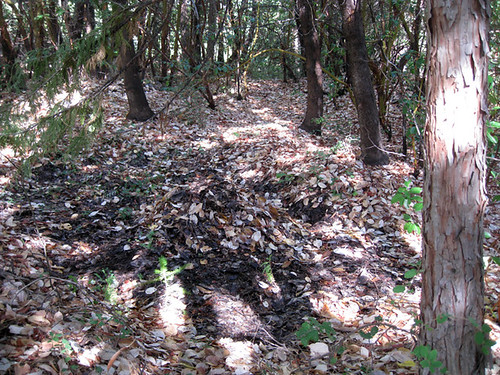To the north of the garden proper and the food forest is a nearly pure stand of Pacific Madrone (Arbutus menzeisii) Very little sunlight reaches the ground here, and the forest floor is piled high with generations of madrone leaves, a rich, moist and thick carpet perhaps 6 inches (or more) deep.
I formulated a plan to gather some of these fallen leaves for a leaf mold pile, and used palettes to construct a 4-sided bin next to the compost pile in the garden proper to hold decaying leaves.
I’ve lately been reading “The One-Straw Revolution” by Masanobu Fukuoka, a classic of natural farming techniques and philosophy, and a touchstone of the permaculture movement. In this slim volume, Fukuoka details his efforts to grow fruits, vegetables and grains in harmony with nature, and outlines four principles for “do-nothing” agriculture: 1) no tilling, 2) no chemical fertilizers or prepared compost, 3) no weeding by tillage or herbicides, and 4) no dependence on chemical pesticides.
As I began raking the leaves and preparing to transport them the 200 or so yards to the leaf mold bin, I had the realization that I was setting myself up for dual effort. That is, I would have to gather many wheelbarrowsful of leaves and wheel them some distance, only to move them again to the garden proper once they were ready to be used as a soil amendment. Perhaps because I was tired from a long day in the garden, or perhaps because the thoughts had had time to germinate, but at that moment, I had a profound (for me anyway) realization about the meaning of “The One-Straw Revolution.” Fukuoka’s techniques, often called do-nothing, are perhaps more properly characterized as right-effort. That is, natural farming still requires considerable doing, but the lesson revealed to me was about choosing the right things to do or to not do. To quote Fukuoka, “How about not doing that?”
Careful to take only this year’s leaves and not disturb the deeper layers, I created piles in situ, and will collect them in a year or so once they’ve decomposed. Well played, Fukuoka-san.


